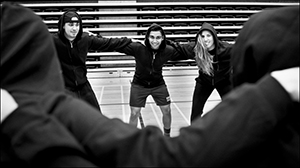- Future Students
- Current Students
- Faculty
- Staff
- Alumni
- Others
Research study shines a spotlight on wellness at UofGH
Prioritizing wellness is critical for post-secondary students, but what does wellness look like at the University of Guelph-Humber, and how are UofGH students feeling about it? Kinesiology Program Head Dr. Leslie Auger and Kinesiology and Psychology instructor Dr. Maya Obadia have teamed up to find out.
Researching wellness at UofGH
Their research study, “Wellness Strategies in Post-secondary Students,” aims to paint a picture of wellness at UofGH that can hopefully be used to implement new wellness strategies in the future. “We looked at other studies that have been done in this area, and we felt that while we can use some of the existing data, we still didn’t want to make assumptions – we wanted to capture information that is specific to University of Guelph-Humber students as opposed to students at other institutions,” says Dr. Obadia.
Dr. Auger says understanding student wellness will help UofGH to create an optimal learning environment that will help students be at their best.
“We want to get a baseline of wellness at UofGH in order to optimize an environment for learning here,” she says. “Awareness on this topic is a big thing, and by bringing awareness to the students at the same time as getting feedback on their current wellness, we hope to move towards providing more opportunities to improve their wellness here.”
She says that without prioritizing wellness, students won’t be able to live up to their full potential. “Students live here for four years, and our goal is the success of our students, so wellness plays a big part in that,” Dr. Auger continues. “If you aren’t well you won’t be bringing your full self and your full potential to whatever you’re doing – unless you are healthy, you can’t perform optimally, and it really impacts every aspect of your life.”
Dr. Obadia agrees, and says it’s an important area for professors and UofGH as a whole to support. “Students are here to go to school and get an education, but that doesn’t happen in a silo. Their lives blend in and blend out, and life is tough, and we need to support their wellness,” says Dr. Obadia.
The mixed-methods study consists of two phases. The first phase consisted of a series of focus groups with UofGH students. Phase 2 is a survey, which will be sent out to all UofGH students on September 23, and will run until October 25.
“Maya and I are energized by the study thus far, and are looking forward to the next phase where we will survey all students at the University of Guelph-Humber to get a better idea of the state of student wellness on campus. This data will inform future research to optimize student wellness and ultimately academic success,” says Dr. Auger.
Dr. Obadia says by completing the survey, students will be adding their voices to an important initiative that can influence wellness at UofGH in the future. “I’m hoping students will take the time to complete the survey, knowing that we’re seeking to understand the important changes we can make, and the interventions we can create that will support some of these students and future students to come – so having their insights can be groundbreaking for what happens in the future,” she says.
UofGH’s Research Grant Fund
The project was made possible through funding from UofGH’s Research Grant Fund, which gives students the opportunity to work with their instructors as paid research assistants on research projects. For this project, UofGH Kinesiology alumnus Timothy Spence and fourth-year Kinesiology student Connor Buchanan were hired as research assistants.
“I truly enjoyed this experience working as a Research Assistant,” says Spence. “For me it was the chance to continue to develop an ideal set of skills for the work I am seeking in the future. I have become passionate about research and academia during my time at Guelph-Humber, so getting a chance to not only become a more effective researcher, but also to work on a project aimed at benefiting the school, made it most enjoyable to be a part of.”
Buchanan says being a research assistant has given him skills that he will take away with him into his final thesis project and future career. “I gained a tremendous insight into what a career could be like working in a research-oriented environment,” he says. “Having this opportunity to be a Research Assistant allowed me to gain experience and knowledge, and made greater my passion for becoming an epidemiologist.”
“For students, working as a research assistant is probably one of the most incredible experiences they have,” adds Dr. Auger. “That research experience, and meeting on a regular basis with the professor and getting to know them, and their research not only gives them insight into that career, but also increases their level of professionalism as a student working with that caliber of researcher.”
Spence agrees, and says he enjoyed the experience of working with his professors. “The opportunity to work closely with faculty was a great experience,” he says. “The student relationship with professors in terms of the classroom setting is different than when you work with them as a team. Those opportunities are unique, and offer a closer look at their work ethic and habits which have brought them the success they have had. In my opinion, it is almost more valuable than the lectures they teach.”







